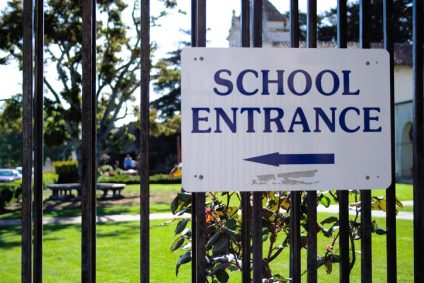
CREDIT: This story was first seen in the Guardian
Police have urged more London schools to install metal scanners to protect children from rising violent crime as the death toll of under-25s from stabbings in the capital this year reached 17. The ‘knife arches’ are one of a range of measures the Metropolitan police believe can help prevent attacks with bladed weapons, which rose by 24% last year in London and are rising nationally, the Guardian reports.
The Guardian has learned that the Met has increased stop and search in knife crime hotspots, fearing a further surge in attacks in the weeks to come. It has also set up a new squad of 80 officers to send into areas to carry out ‘murder suppression’ work as well as trying to foster closer cooperation between officers and schools and communities.
DCS Michael Gallagher, one of the Met’s leaders on its anti-knife initiative, Operation Sceptre, said knife arches in schools would help pupils stay safer. “There is a growing body of headteachers that think it is probably a good idea,” he said,
He said the perceived “stigma” of having a knife arch was outweighed by the benefits. “What we are seeing a lot of is attacks at the school gates,” he said.
Gallagher said the characteristics of knife crime varied in different areas. In Croydon, south London, attacks tend to be linked to school closing times and occur near transport hubs, while in nearby Lambeth, the focus is around the night-time economy and offenders are older, he said.
Last year 49 people aged 25 or under died after being stabbed in London, out of a total of 105 homicides. This year’s toll reached 17 when a 23-year-old man died following a knife attack in Enfield, north London, on Tuesday. In the last week of April, six people died in stabbings in London.
Danny Coyle, the head of Newman college in Brent, north-west London, backed the idea of installing knife arches in schools. “We conduct frequent ‘safety arches’ which are well received by pupils, teachers and parents alike. These are conducted in an atmosphere of good humour and have the additional benefit of developing positive relationships with the police and young people,” he said.
But the former Scotland Yard superintendent Leroy Logan said the metal detectors at best displace the problem. “How many stabbings are there in schools? Not that many. All they do is stash the weapons outside. You need the intelligence to find the weapons. Knife arches displace the problem – they are cosmetic,” he said.
Gallagher said police were concerned that there was about to be a spike in knife crime, which they said they had previously seen between the two May bank holidays. “The days get longer and the weather gets a bit more clement. Victim and offender groups are out on the streets a bit more,” he said.
Furthermore, demographic factors could fuel a rise, Gallagher said. London’s population is predicted to climb to over 10 million by 2025, with the group aged 25 or under, which is the peak offending age, growing.
The new Met commissioner, Cressida Dick, has said that tackling rising knife and other violent crime is a priority and that she was prepared to increase use of stop and search, despite past clashes with government over the tactic.
Gallagher said a “pause” in stop and search was over, and intelligence was being used to increase it in knife crime hotspots. He claimed stops were falling in other areas. He said four out of 10 stops were producing a result in knife crime areas, a high hit rate for the tactic, which in 2010 saw only one in 10 produce a result.
Stop and search is dogged by growing evidence that many innocent people are challenged, with the result that community relations become poisoned. Gallagher there was community support for limited and targeted increases in stops, and that body cameras on officers boosted the confidence of police and those they stop, and reduced complaints. But Logan said: “Even if it is four out of 10, you are annoying six out of 10 unnecessarily.”
Logan, who works on an anti-gang initiative and is a former leader of the Black Police Association, said the Met’s response to knife crime had been lacking for years, hampered by low community confidence levels, which costs them intelligence. “It could be a lot better if you had greater trust and confidence, especially among young people, because they feel they are over-policed and under-protected, due to the heavy-handed policing they experience,” he said.
Theresa May, as home secretary, clashed with the Met in 2015, saying increased stop and search was not needed to tackle rising violent crime.
Police say a quarter of knife crime in the capital is associated with gang activity. Online platforms such as YouTube and Facebook are often used by gangs to taunt their rivals, which sometimes triggers an attack. In Birmingham, a gang called 61, named after a bus route, allegedly used YouTube to taunt a rival group called Frankley Killers. The bizarre and chilling video saw a gang choreograph a dance number, alleged to contain coded messages to taunt their rivals. Passing school pupils have been attacked, and one headteacher urged parents to keep their children indoors after dark, the Birmingham Mail reported.
Gallagher said police in London were seeing the same phenomenon and were talking to social media companies to act faster on police requests to take such material down.
Don’t forget to follow us on Twitter, like us on Facebook, or connect with us on LinkedIn!

Be the first to comment